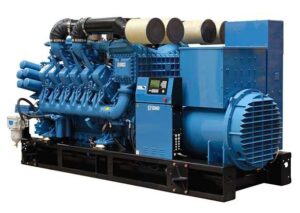Diesel generator
A generator is a machine that converts mechanical energy into electrical energy through electromagnetic induction.
A diesel generator is also called a generator that uses diesel or diesel fuel to generate electricity.
A diesel generator is a combination of a diesel engine with an electric generator (often a dynamo) to produce electrical energy.
Today, diesel generators have many applications in industry and even people’s daily lives. These motors are usually used in places where there is no access to city electricity. The main function of diesel generators is to produce electricity.
Diesel generators are usually produced and supplied in different dimensions for different applications. These dimensions are determined based on their apparent power. Apparent power means the same unit as volt-ampere (VA) in electrical engineering. Diesel generators are produced in small dimensions of about 200 KV and are used for emergency purposes, especially in sudden power outages.
Also, there are large diesel generators that have the ability to produce megavolt-ampere power, and some of them are used in small power networks.

Types of diesel generators
Diesel generators are generally divided into the following categories according to their application:
- Standby Diesel Generator (Standby Diesel Generator): The efficiency of the emergency generator is when the grid power is cut off. In this situation, the emergency diesel generator enters the circuit as a backup and temporarily and with maximum power, it will supply the electricity needed by the system, such as providing emergency electricity to residential areas and hospitals.
- Prime Diesel Generator: Generators that are designed to work for a longer period of time than standby diesel generators, and one of their features is constant load with less than 75% power. For example, in times when city electricity is cut off frequently or for a long time, or in areas where city electricity is not available and generators must be used continuously, such as exploring mines and camps.
- Continuous Diesel Generator: Continuous generators are designed and produced for continuous and uninterrupted use, such as continuous power supply for data centers.
Diesel generator components
-
Diesel Engine
-
Generator
-
Diesel generator chassis and fuel tank
-
Main electrical panel or protection and control panel
Generator size
The generator set is based on the electrical load for which it is considered in the supply, all the characteristics of electrical loads Kwe, KVA, VAR and harmonic content including starting currents (generally from the motor) and non-linear loads.
The expected task, for example, emergency affairs, continuous or primary capacity, as well as environmental conditions such as altitude, temperature and regulation of greenhouse gases should be considered.
Many manufacturers of larger generators will offer a suite of software that will perform complex sizing calculations simply by reading site conditions and the characteristics of the connected electrical load.
